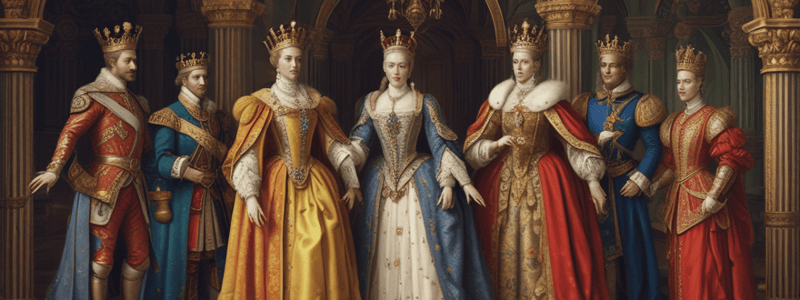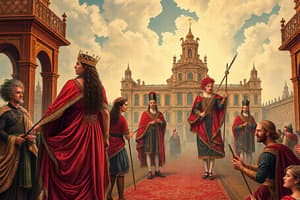Podcast
Questions and Answers
What was the primary role of the monarchy in 19th century Europe?
What was the primary role of the monarchy in 19th century Europe?
- A leader of the military
- A symbol of national power
- A representative of the working class
- An incarnation of historical memory (correct)
What was the main reason for the increased elaboration of coronations and burials after the First World War?
What was the main reason for the increased elaboration of coronations and burials after the First World War?
- To celebrate the Queen's birthday
- To assert the monarch's power over the government
- To mark the end of the war
- To rectify the farcical state of royal tradition in the 19th century (correct)
What determines the Queen's occupation of the throne?
What determines the Queen's occupation of the throne?
- Statute, case law, and conventions (correct)
- Royal decree
- Statute and conventions
- Case law and conventions
What was the main concern regarding the succession of the throne after William III's reign?
What was the main concern regarding the succession of the throne after William III's reign?
What was the primary purpose of the Act of Settlement in 1701?
What was the primary purpose of the Act of Settlement in 1701?
Who was the first monarch to accede to the throne under the Act of Settlement?
Who was the first monarch to accede to the throne under the Act of Settlement?
What was the condition for the heirs of Sophia's body to inherit the throne?
What was the condition for the heirs of Sophia's body to inherit the throne?
How many people were closer to the throne by rules of inheritance than George I?
How many people were closer to the throne by rules of inheritance than George I?
What is the purpose of the Sovereign Grant Act 2011?
What is the purpose of the Sovereign Grant Act 2011?
What is the main impact of the Succession to the Crown Act 2013?
What is the main impact of the Succession to the Crown Act 2013?
What is the title of the Queen as established by the Royal Title Act 1953?
What is the title of the Queen as established by the Royal Title Act 1953?
What was the significance of the Case of Proclamations 1611?
What was the significance of the Case of Proclamations 1611?
What was the problem with the coronation of Queen Victoria in June 1838?
What was the problem with the coronation of Queen Victoria in June 1838?
What was unusual about the coronation of King George IV in July 1821?
What was unusual about the coronation of King George IV in July 1821?
What is the purpose of the Regency Acts?
What is the purpose of the Regency Acts?
What is the principle of succession to the throne established by the Succession to the Crown Act 2013?
What is the principle of succession to the throne established by the Succession to the Crown Act 2013?
What happened to the ring when the Archbishop of Canterbury put it on the Queen's finger?
What happened to the ring when the Archbishop of Canterbury put it on the Queen's finger?
What was the purpose of early 20th century newsprint?
What was the purpose of early 20th century newsprint?
What did the Succession to the Crown Act 2013 do?
What did the Succession to the Crown Act 2013 do?
Where was Queen Elizabeth when she ascended her various thrones?
Where was Queen Elizabeth when she ascended her various thrones?
What was the age of King George VI when he died?
What was the age of King George VI when he died?
What is the King restricted from doing according to the common law?
What is the King restricted from doing according to the common law?
What is the convention regarding the monarch and Parliament?
What is the convention regarding the monarch and Parliament?
When did the Commonwealth countries agree in principle to the changes to the rules of succession?
When did the Commonwealth countries agree in principle to the changes to the rules of succession?
When was Elizabeth crowned Queen Elizabeth II?
When was Elizabeth crowned Queen Elizabeth II?
What was the state of Europe at the time of Elizabeth's accession?
What was the state of Europe at the time of Elizabeth's accession?
What was the condition of Britain's economy at the time of Elizabeth's accession?
What was the condition of Britain's economy at the time of Elizabeth's accession?
What was mandatory for British men in 1952?
What was mandatory for British men in 1952?
Why was Elizabeth able to travel the world without leaving her kingdom?
Why was Elizabeth able to travel the world without leaving her kingdom?
What is one of the Queen's notable achievements?
What is one of the Queen's notable achievements?
How did the Queen respond to the death of Princess Diana in 1997?
How did the Queen respond to the death of Princess Diana in 1997?
How is the Queen generally viewed today?
How is the Queen generally viewed today?
What role does the Queen play in the British monarchy, according to the passage?
What role does the Queen play in the British monarchy, according to the passage?
What was Benjamin Franklin's opinion of King George III?
What was Benjamin Franklin's opinion of King George III?
What percentage of Americans thought the royal family was 'a good thing' in 2011?
What percentage of Americans thought the royal family was 'a good thing' in 2011?
What was the amount of the Sovereign Grant for the royal family in 2012-13?
What was the amount of the Sovereign Grant for the royal family in 2012-13?
What is the term for the annual expenditure funded by the taxpayer in support of the Queen's official duties?
What is the term for the annual expenditure funded by the taxpayer in support of the Queen's official duties?
Who wrote the article 'A revolutionary republic embraces the royals'?
Who wrote the article 'A revolutionary republic embraces the royals'?
What is the term for the figures like Prince Harry, known for their antics?
What is the term for the figures like Prince Harry, known for their antics?
What is the term for the figures like Princess Diana, known for their tragic fate?
What is the term for the figures like Princess Diana, known for their tragic fate?
Flashcards are hidden until you start studying
Study Notes
The British Monarchy
- In the 19th century, most of Europe was governed by royal dynasties, whereas in the UK, the monarchy represents historical memory rather than real power.
The Queen's Role
- The Queen's powers have been crafted over time by statute, case law, and conventions.
- The Queen occupies the throne by virtue of statute.
- The rules of succession to the throne largely stem from the dilemma facing the monarchy at the end of William III's reign.
Succession to the Throne
- The Act of Settlement (1701) ensured the Crown would pass to Sophia, Electress of Hanover and granddaughter of James I, and to "the heirs of her body, being Protestants".
- In 1714, Sophia's son, George Ludwig, Elector of Hanover, acceded to the throne as George I, despite 57 Roman Catholics being closer in line to the throne.
Key Statutes
- The Regency Acts (1937, 1943, and 1953) provide for certain contingencies that might affect the monarch.
- The Royal Title Act (1953) established the Queen's exact title as "Elizabeth II, by the Grace of God of Great Britain, Ireland and the British Dominions Beyond the Seas, Queen, Defender of the Faith".
- The Sovereign Grant Act (2011) governs the resources provided for use by the Royal Household in support of the Queen's official duties.
- The Succession to the Crown Act (2013) made succession not depend on gender, giving women equal rights to succeed to the throne.
Case Law
- The Case of Proclamations (1611) defined the monarch's role, stating the King cannot create an offense that did not exist before without Parliament's consent.
Coronations and Burials
- Coronations and burials grew more elaborate after World War I to rectify the farcical state of royal tradition in the 19th century and to demonstrate allegiance to the monarchy.
- Examples of elaborate coronations include King George IV's in 1821 and Queen Victoria's in 1838.
The Queen's Achievements
- Queen Elizabeth II has reigned for over 60 years, showcasing duty, discipline, and discretion.
- She is viewed with utmost respect for her age and as a symbol of continuity in a changing world.
Public Perception
- The British public has a strong affection for the monarchy, with 71% thinking it is a "good thing".
- The royal family enjoys an approval rating of 77% in the US, with 71% considering it a "good thing".
Financial Costs
- The Sovereign Grant for the royal family, funded by the taxpayer, amounted to £33.3 million for 2012-13.
Studying That Suits You
Use AI to generate personalized quizzes and flashcards to suit your learning preferences.




